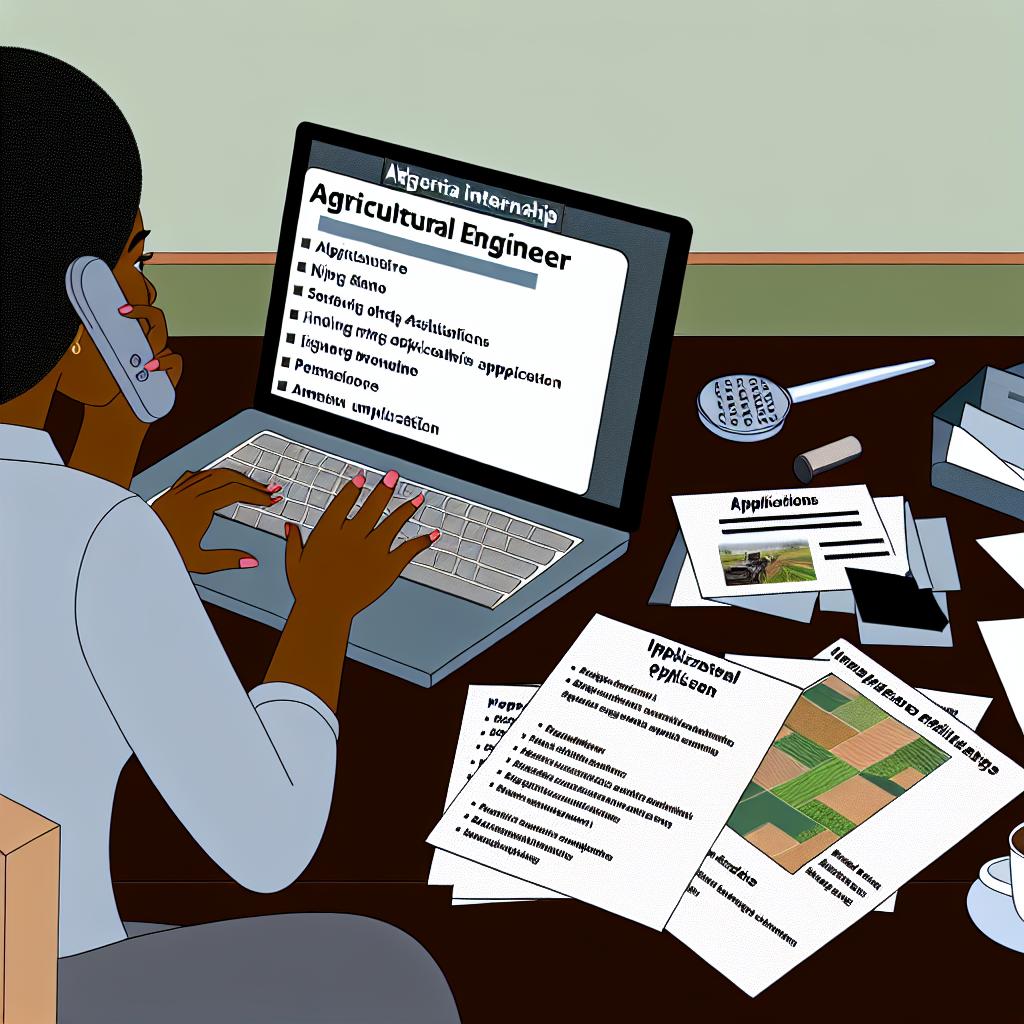Introduction
Agricultural engineering internships are valuable opportunities for students to gain hands-on experience in the field.
These internships provide practical training and insight into the agriculture industry.
During an internship, students can expect to work alongside professionals, learn about innovative technologies, and gain a deeper understanding of agricultural practices.
Researching and Identifying Potential Internship Opportunities
When it comes to finding agricultural engineering internships, it’s essential to utilize various methods to uncover potential opportunities.
Utilizing Online Platforms
- Begin your search by exploring online platforms dedicated to listing internship opportunities in the agricultural engineering field.
- Websites like Internships.com, Indeed, and LinkedIn are great places to start your search for relevant internships.
- Use specific keywords such as “agricultural engineering internships” to narrow down your search and find suitable options.
- Regularly check these platforms and set up email alerts to stay informed about new internship postings.
Contacting Agricultural Engineering Companies
- Take the initiative to reach out directly to agricultural engineering companies in your area or region.
- Visit their websites and look for career or internship opportunities to see if they have any openings available.
- Send a well-crafted email expressing your interest in interning with their company and inquire about any potential opportunities.
- Networking with professionals in the field can also provide valuable insights and leads on internship opportunities within these companies.
Networking with Professionals
- Attend industry events, conferences, or networking mixers to connect with professionals in the agricultural engineering field.
- Engage in conversations, exchange contact information, and express your interest in securing an internship in the industry.
- Follow up with these connections through email or LinkedIn to inquire about any internship opportunities they may be aware of.
- Building a strong network can open doors to internship opportunities that may not be publicly advertised.
Tailoring Your Resume and Cover Letter for Agricultural Engineering Internships
- Highlighting relevant coursework, skills, and experiences.
- Emphasizing any previous internships or projects related to agricultural engineering.
- Customizing application materials for each internship opportunity.
When applying for agricultural engineering internships, it is crucial to tailor your resume and cover letter to showcase your qualifications and experiences effectively.
By highlighting specific coursework, skills, and experiences, you can demonstrate your expertise in the field and increase your chances of securing an internship.
Highlighting Relevant Coursework, Skills, and Experiences
Start by identifying the most relevant coursework, skills, and experiences that align with the requirements of the agricultural engineering internship.
Include details such as specific courses related to agriculture, engineering principles, and technical skills relevant to the position.
This can show your potential employer that you have the necessary knowledge and expertise to excel in the role.
Highlight any hands-on experiences, such as projects, research work, or extracurricular activities, that demonstrate your practical skills in agricultural engineering.
For example, if you have participated in a research project related to crop management or soil analysis, be sure to emphasize this in your resume and cover letter.
Employers value practical experience and will be impressed by your hands-on involvement in relevant projects.
Emphasizing Previous Internships or Projects Related to Agricultural Engineering
If you have completed previous internships or projects in the field of agricultural engineering, make sure to highlight these experiences prominently in your application materials.
Employers appreciate candidates with practical experience, as it demonstrates your ability to apply theoretical knowledge to real-world scenarios effectively.
Describe your previous internships or projects in detail, focusing on the specific tasks you were involved in, the skills you developed, and the outcomes you achieved.
Emphasize any successful results or contributions you made during these experiences, as this can set you apart from other applicants and showcase your value as a potential intern in agricultural engineering.
Customizing Application Materials for Each Internship Opportunity
It is essential to customize your resume and cover letter for each internship opportunity to align with the specific requirements and preferences of the employer.
Tailor your application materials by incorporating keywords from the job description, highlighting relevant experiences that match the internship responsibilities, and showcasing your enthusiasm for the position.
Research the company and understand its values, mission, and culture to tailor your application effectively.
Customize your cover letter to demonstrate your interest in the company and how your skills and experiences align with its goals.
By personalizing your application materials, you can show your dedication and commitment to pursuing an internship in agricultural engineering.
Tailoring your resume and cover letter for agricultural engineering internships is essential to stand out as a strong candidate.
By highlighting relevant coursework, skills, and experiences, emphasizing previous internships or projects, and customizing your application materials for each opportunity, you can increase your chances of securing the internship you desire.
Put in the time and effort to tailor your application, and you will be well on your way to a successful internship in agricultural engineering.
Delve into the Subject: Top Nigerian Universities Offering Metallurgical Engineering
Preparing for Agricultural Engineering Internship Interviews
When preparing for the interview process for agricultural engineering internships, there are several key steps you can take to make sure you are ready to impress potential employers.
Here are some strategies to help you ace the interview.
Researching the Company and Its Projects in Advance
- Visit the company’s website to learn about their mission, values, and current projects.
- Understand their role in the agricultural engineering industry and how they contribute to it.
- Research any recent news articles or press releases related to the company.
Practicing Common Interview Questions Related to Agricultural Engineering
- Prepare for technical questions about your knowledge of agricultural engineering principles.
- Practice answering behavioral questions that highlight your problem-solving skills and teamwork abilities.
- Be ready to discuss past experiences that demonstrate your passion for agricultural engineering.
Demonstrating a Strong Passion for the Field During the Interview
- Communicate your enthusiasm for agricultural engineering and why you are interested in the field.
- Share examples of projects or research activities you have been involved in that showcase your passion.
- Express your eagerness to learn and grow in the field of agricultural engineering through the internship.
By following these steps and preparing thoroughly for the interview process, you can increase your chances of securing the agricultural engineering internship of your dreams.
Remember to showcase your skills, knowledge, and passion for the field to stand out to potential employers.
Discover More: Professional Associations for Surveyors in Nigeria
When embarking on an agricultural engineering internship, it is crucial to make the most of this valuable learning opportunity.
Here are some key tips on how to maximize your experience:
Setting Clear Goals and Objectives
- Define what you hope to achieve during your internship in terms of skills, knowledge, and experience.
- Set specific and measurable goals that will guide your learning and development throughout the internship period.
- Regularly assess your progress towards these goals and make adjustments as needed to stay on track.
Actively Seeking Mentorship and Guidance
- Identify professionals in the field who can serve as mentors and provide valuable insights and advice.
- Engage with these mentors regularly to seek guidance on your career path, projects, and skill development.
- Be open to feedback and constructive criticism, as this can help you grow and improve as a future agricultural engineer.
Engaging in Hands-On Projects and Tasks
- Take on challenging projects and tasks that will allow you to apply your theoretical knowledge in a practical setting.
- Seek out opportunities to work directly with farm equipment, machinery, and technology to gain hands-on experience.
- Be proactive in seeking out new tasks and responsibilities to broaden your skills and knowledge base.
By setting clear goals, seeking mentorship, and engaging in hands-on projects, you can make the most of your agricultural engineering internship and emerge as a skilled and knowledgeable professional in the field.
Find Out More: Marine Engineering: Innovations Shaping the Future

Building Connections and Networking in the Agricultural Engineering Industry
Networking is a crucial aspect of finding the right agricultural engineering internships.
Building connections within the industry can open up various opportunities for internships and future career prospects.
Attending Industry Conferences, Workshops, and Events
- Participating in industry events allows you to meet professionals and recruiters in person.
- These events provide a platform to showcase your skills and passion for agricultural engineering.
- Engaging in conversations and discussions can help you build valuable connections.
- Stay updated on the latest trends and technologies in the field through these events.
Connecting with Professionals on LinkedIn and Other Social Platforms
- Create a professional profile on LinkedIn highlighting your academic achievements and skills.
- Connect with professionals in the agricultural engineering industry to expand your network.
- Engage with their posts, share relevant content, and participate in industry discussions.
- Reach out to professionals for advice, mentorship, or potential internship opportunities.
Seeking Out Informational Interviews with Professionals in the Field
- Reach out to professionals through email or LinkedIn to request informational interviews.
- Prepare thoughtful questions about their career journey, insights about the industry, and internship opportunities.
- Use these interviews to learn more about the agricultural engineering field and make meaningful connections.
- Express your interest in gaining hands-on experience through internships in the field.
By actively building connections and networking in the agricultural engineering industry, you can increase your chances of finding the right internship that aligns with your career goals and aspirations.
Transform Your Career with Expert Guidance
Get personalized mentorship consulting that’s tailored to your unique path. Our expert advice is actionable and exclusive.
Get StartedGain More Insights: Building a Sustainable Farm with Engineering Principles
Paths to Pursue Agricultural Engineering Internships
After exploring various ways to find agricultural engineering internships, it is evident that persistence and dedication are crucial in securing such opportunities.
It is important to actively reach out to companies, utilize online platforms, and network with professionals in the field.
Internships offer valuable hands-on experience and allow students to apply their theoretical knowledge in real-world settings.
By being proactive and taking the initiative to pursue internships, individuals can gain practical skills and enhance their career prospects in agricultural engineering.
Therefore, it is essential for aspiring agricultural engineers to remain committed to their search.
Continuously seeking opportunities will help them further their knowledge and skills.
By demonstrating a strong work ethic and a passion for the field, individuals can increase their chances of securing rewarding internships that align with their career goals.
Additional Resources
Akinbode Adedeji | Biosystems and Agricultural Engineering
My Journey to Becoming a Data Scientist at Spotify | Zikoko!




